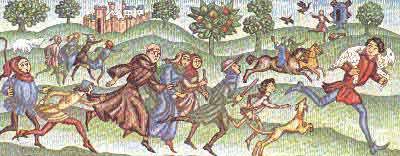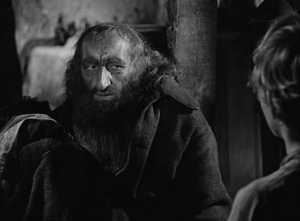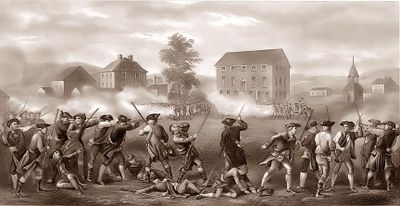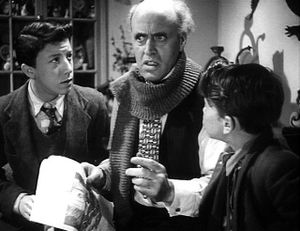Template:Hear: Difference between revisions
m (→Etymology) |
m (→Early America) |
||
| Line 59: | Line 59: | ||
The real problem in society is the people's fault, for society is born out of the heart of the people. If they do not love their neighbor as themselves then their neighbor will not love them. It is the [[Slothful|sloth and avarice]] of the people which gives power to and corrupts government which in turn licenses the [[Wantonness|wantonness]] sloth and avarice of society spiraling all of society into a state of corruption. | The real problem in society is the people's fault, for society is born out of the heart of the people. If they do not love their neighbor as themselves then their neighbor will not love them. It is the [[Slothful|sloth and avarice]] of the people which gives power to and corrupts government which in turn licenses the [[Wantonness|wantonness]] sloth and avarice of society spiraling all of society into a state of corruption. | ||
People today take from their neighbor through the governments they elect in social welfare schemes from [[Public Education]] to [[Health|health care]]. Without a social welfare system that depends upon [[Freewill offerings]] and [[Fervent Charity]] the [[Social Virtues]] what once bound Americans together will diminish. There will be no more hue and cry in the land. People will be robbed and raped in the streets and no one will come to their aid. They will say "It is not my job" and | People today take from their neighbor through the governments they elect in social welfare schemes from [[Public Education]] to [[Health|health care]]. Without a social welfare system that depends upon [[Freewill offerings]] and [[Fervent Charity]] the [[Social Virtues]] what once bound Americans together will diminish. There will be no more hue and cry in the land. People will be robbed and raped in the streets and no one will come to their aid. They will say "It is not my job" and "Leave it to the professionals." | ||
Like Sodom and Gomorrah unnatural perversions of men and women will become commonplace and the family will breakdown and even be attacked as an institution. The people will turn their natural responsibilities over to government offices of power. That power will corrupt the governments they create and the rights of the individual will diminish. | Like Sodom and Gomorrah unnatural perversions of men and women will become commonplace and the family will breakdown and even be attacked as an institution. The people will turn their natural responsibilities over to government offices of power. That power will corrupt the governments they create and the rights of the individual will diminish. | ||
Revision as of 08:38, 1 February 2023

Love thy Neighbor
In common law, a hue and cry is a process by which bystanders are summoned to assist in the apprehension of a criminal who has been witnessed in the act of committing a crime.
- a loud outcry formerly used in the pursuit of one who is suspected of a crime
- the pursuit of a suspect or a written proclamation for the capture of a suspect
- a clamor of alarm or protest
When the Hue & Cry is heard no more in the land no one will be safe and there will be no salvation for the living or the dead.
Hue & Cry – posse comitatus

- "The roots of local responsibility for crime prevention seem to lie in Anglo-Saxon customs that placed prevention squarely on the local community through the tithing and the “Hue and Cry”. Every male over the age of 12 had to belong to a group of nine others, called a tithing. These ten men were responsible for the behaviour of each other. If one of them broke the law, the others had to bring that person before the court. The sanction, to make the system work, was that if they did not, they would all be held responsible for the crime." Credited to and Published by the Bingham Heritage Trails Association
By the Statute of Winchester of 1285, 13 Edw. I cc. 1 and 4, it was provided that anyone, either a constable or a private citizen, who witnessed a crime shall make hue and cry, and that the hue and cry must be kept up against the fleeing criminal from town to town and from county to county, until the felon is apprehended and delivered to the sheriff.
All able-bodied men, upon hearing the shouts, were obliged to assist in the pursuit of the criminal, which makes it comparable to the posse comitatus. It was moreover provided that "the whole hundred … shall be answerable" for any theft or robbery, in effect a form of collective punishment. Those who raised a hue and cry falsely were themselves guilty of a crime.
The reference to "the whole hundred" has to do with a prominent system of government known as the tens, hundreds and thousands which stemmed back to before ancient Israel. All free people used some form of these networking groups bound together by a common sense of justice, or what became known as the common law.
Anglo-Saxons, Tuns, were divided into family groups of ten, called a Tithing. Ten of these family assemblies formed a hundred and ten hundreds formed a thousand. They were the means by which all charity, justice and warfare were conducted.
Etymology
Webster's 1828 Dictionary describes it like this - HUE, in the phrase hue and cry, signifies a shouting or vociferation. In law, a hue and cry is the pursuit of a felon or offender, with loud outcries or clamor to give an alarm.
It is possible that it is an Anglicization via Anglo-French of the Latin, hutesium et clamor, meaning "a horn and shouting". But other sources indicate that it has always been a somewhat redundant phrase meaning an outcry and cry. "Hue" appears to come from the Old French huer which means to shout, and Old French crier which means to cry.
“The civil law reduces the unwilling freedman to his original slavery; but the laws of the Angloes judge once manumitted as ever after free.”[1]
“The term republic, res publica, signifies the state independently of its form of government.”[2]
Social contracts bind the people as they apply to the Welfare state for benefits at the expense of their neighbor. This coveting relationship with the Benefactors of the State makes the people human resources.

During hard times, or in the case of war, people form natural bonds that often give them more strength than their adversaries. Loyalty, honor, brotherhood bring a strength of their own to a situation that makes a superior regiment to what should be considered a weaker opponent.
The social compact enforced by men who exercise authority over the community can undermine the brotherhood of society. Social welfare must be dependent upon faith, hope, and charity to nurture the honor of society so that when catastrophe overcomes a community the people are better prepared to meet it with mutual resolve and concern, having become accustomed to the process over time.

Early America
When America was first settled the people had to rethink their view of society in order to survive. They thought that government could protect them with policies like "From each according to his ability, to each according to his need."
The products of the people's labor were put into a common store house as if it was One purse to draw from. They thought they would guarantee their survival by this socialist approach and dependence on government authority for the distribution of the assets of all. This had produced constant shortages of food and annual starvation. It also produced a shortage of justice and courage to defend society because people cared more about the "storehouse" than their neighbor.
Finally, some figured it out, although it had been a Biblical principle from the beginning. It was encompassed in all the teachings of Old and New Testaments. Even though most thought themselves Christians and studied the Bible they did not understand basics like Thou shalt not covet... any thing that is thy neighbor’s and even "Love thy neighbor as thyself".
When they returned to principles like private property, the product of your own labor was yours, and only the producer had the right to distribute and share his labor according to his own good conscience, they began to thrive.
When neither your neighbors nor the government had the right to take what was produced by you, society began to change in more profound ways. Private property, private right, and the end of socialism altered the thinking of the people. They not only had to take care of themselves but also defend the right of others to maintain their own property, in the hope that their neighbor would be there for them, if they needed assistance in the case of violent incursions of others or during more catastrophic events.
Now that Americans are back to thinking that coveting their neighbor's goods is okay as long as they do it through governments composed of men who call themselves benefactors society itself is being changed. The people look to government for Health, Education, and Welfare. They have become ignorant of the personal sacrifices and choices required in maintaining liberty for all. They imagine that the problems of society are the government's fault and they only see a need to make changes within that government.
The real problem in society is the people's fault, for society is born out of the heart of the people. If they do not love their neighbor as themselves then their neighbor will not love them. It is the sloth and avarice of the people which gives power to and corrupts government which in turn licenses the wantonness sloth and avarice of society spiraling all of society into a state of corruption.
People today take from their neighbor through the governments they elect in social welfare schemes from Public Education to health care. Without a social welfare system that depends upon Freewill offerings and Fervent Charity the Social Virtues what once bound Americans together will diminish. There will be no more hue and cry in the land. People will be robbed and raped in the streets and no one will come to their aid. They will say "It is not my job" and "Leave it to the professionals."
Like Sodom and Gomorrah unnatural perversions of men and women will become commonplace and the family will breakdown and even be attacked as an institution. The people will turn their natural responsibilities over to government offices of power. That power will corrupt the governments they create and the rights of the individual will diminish.
Colonies like Plymouth and Jamestown began with a socialist view that produced starvation and death. In time they would eventually reject the idea of - from each according to his ability, and to each according to his need - and then take back their responsibility.
When private property was secured from the state, famine ended and charity began. This changed the course of history and set the scene for liberty.
Early American colonies had to defend one another against the elements of a wilderness and the savagery of those times. They began to understand with this new view why William Pitt said “As long as we look to government to solve our problems we will always suffer tyranny.” It altered society so that love, honor, and righteousness became the lifeblood of that society.
A departure from those principles and ways, will again alter society to its beggarly estate.[3]
It has always been the commandment of God that we should not covet our neighbor's goods but love one another in a system of Corban that makes the word of God to effect because it is based on charity rather than force. Early Israel and the early Church were not engaged in the covetous practices of Rome which makes people merchandise and curses children with a surety for debt entangling them again in a yoke of bondage to the world. There is a lot of injustice today but it goes unseen because the people have become slothful and apathetic. There needs to be a hue and cry in the land, and the people need to learn to attend to the Weightier matters.

Christ Issues
What are the issues of Christ?
What did he condemn in that society?
It was the Corban of the Pharisees that made the word of God to no effect because what had been freewill offerings became a system of taxation like Social Security. It was this fact that that caued their corban to not bear fruit.[4] The people did not only do less for their parents but less for their neighbor. Without the daily practice of love and charity there was no more Hue and cry in the land and the people more and more failed to attend to what Jesus called the Weightier matters of the law, judgment, mercy, and faith which include caring for the needs of our neighbors and the widows and orphans of our society through Pure Religion in matters of health, education, and welfare. We are NOT to provide for the needy of society through the Covetous Practices and the men who call themselves benefactors but who exercise authority one over the other like the socialists do.
The Way of Christ was like neither the way of the world of Rome nor the governments of the gentiles who depend on those fathers of the earth through force, fear and fealty who deliver the people back in bondage again like they were in Egypt. Christ's ministers and true Christians do not depend upon systems of social welfare that force the contributions of the people like the corban of the Pharisees which made the word of God to none effect. Many people have been deceived to go the way of Balaam and the Nicolaitan and out of The Way of Christ and have become workers of iniquity.
The Christian conflict with Rome in the first century Church appointed by Christ was because they would not apply to the fathers of the earth for their free bread but instead relied upon a voluntary network providing a daily ministration to the needy of society through Faith, Hope, and Charity by way of freewill offerings of the people, for the people, and by the people through the perfect law of liberty in Free Assemblies according to the ancient pattern of Tuns or Tens as He commanded.
The modern Christians are in need of repentance.
"Follow me!" —Jesus the Christ.
- One of the most important things to do is to become involved in a network of Charitable Practices. Everyone should want to join a Living Network of Love and Charity.
- If you think you have a calling to be a Minister of God or you might want to dedicate your life to Christ as an Ordained Minister of His Holy Church, contact us to start the process of discipleship and become the benefactors who exercise only love, NOT authority.[5]
This means that if you believe in Christ you need to Network together in a community and society of love and sacrifice. It means you have to give and forgive with courage and honor to those who seek a righteous resolution to those matters.
The socialist state weakens the poor in a time of affluence and then bankrupts the state in spirit and in truth.
- ↑ Libertinum ingratum leges civiles in pristinalm servitutem redigulnt; sed leges angiae semel manumissum semper liberum judicant. Co. Litt. 137.
- ↑ Bouvier’s Vol.1. page 13 (1870).
- ↑ Galatians 4:9, we see, “But now, after that ye have known God, or rather are known of God, how turn ye again to the weak and beggarly elements, whereunto ye desire again to be in bondage?”
- ↑ Matthew 21:43 Therefore say I unto you, The kingdom of God shall be taken from you, and given to a nation bringing forth the fruits thereof.
- ↑ Matthew 20:25-26 But Jesus called them unto him, and said, Ye know that the princes of the Gentiles exercise dominion over them, and they that are great exercise authority upon them. But it shall not be so among you: but whosoever will be great among you, let him be your minister;
Mark 10:42-43 But Jesus called them to him, and saith unto them, Ye know that they which are accounted to rule over the Gentiles exercise lordship over them; and their great ones exercise authority upon them. But so shall it not be among you: but whosoever will be great among you, shall be your minister:
Luke 22:25-26 And he said unto them, The kings of the Gentiles exercise lordship over them; and they that exercise authority upon them are called benefactors. But ye shall not be so: but he that is greatest among you, let him be as the younger; and he that is chief, as he that doth serve.